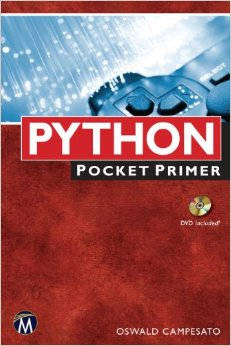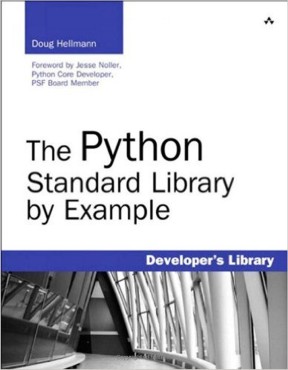| Books for Pythonistas |
| Monday, 03 August 2015 | ||||
Page 2 of 3
When looking for a Python reference you need to bear in mind that Python 2 and Python 3 are separate branches of the language and the first two of our first recommendations only cover Python 2.
Python: Pocket PrimerAuthor: Oswald Campesato There is a lot of Python to keep in your head, so a pocket primer sounds like a good idea. This one comes with a CD containing extra material and solutions to the odd numbered exercises, something that alerts you to the fact that this is more than a reference work.
Reviewer Mike James concludes: Overall this is a good book, if you want to brush up on your Python 2.7. It has two big failings. The first of which is that it goes off into too many peripheral topics which are interesting, but not to every Python programmer. The second is that it really doesn't do Python class-based programming justice. Many Python programmers never make use of object oriented programming simple writing functions to get everything done. This is a shame and this primer doesn't do anything to change it. Despite these problems this is a good primer, and a really good primer if you want to know not just about how the language works, but how to get particular things done - regular expressions, Python and database and so on. It is more like a cross between a primer and cookbook.
The next choice is a reference not to the language itself but instead to the frameworks that surround Python. The Python Standard Library by ExampleAuthor: Doug Hellmann Reviewer Alex Armstrong points out that if you don't know what is in the Python Standard Library you might well waste a great deal of time reinventing the wheel. Equally to know something exists but not to know exactly what it can do is a problem. This book, which is based on Doug Hellmann's Python Module of the Week website attempts to show you the Standard Library in detail and so get you up to speed creating real Python programs. While the book presents a lot of code it is for Python 2.7 and not all of it will port to Python 3. This is a big book in which the library's different functions and data structures are explained and then their use is illustrated by a, sometimes quite long, example. The topics covered are pretty much what you would expect: text. data structures, algorithms, dates and times, mathematics, the file system, data persistence and exchange, data compression and archiving, cryptography, processing and threads, networking, internet, email, application building blocks, internationalization and localization, tools, runtime features, language tools and finally modules and packages.
Alex Armstrong writes: In most cases you are going to use it to clarify how some part of the library works when you have a specific problem to solve and in this role it makes excellent background reading. He concludes: There is a lot of good code in this book and good code is worth buying. The final recommendation has the advantage of covering both Python 2 and Python 3. Python Pocket ReferenceAuthor: Mark Lutz In this short, pocket-sized book Mark Lutz, author of Learning Python, starts off with the sort of basics you would expect - how to get the Python interpreter running and command line switches - and then dives straight into the language with built in types and operators and goes on to covers the standard data structures - Strings, Lists, Dictionaries, Tuples, Files and Sets. Having finished with data the next part of the book goes through each Python statement in turn from Assignment to the with statement. Given that there is so much material to get through many of the explanations are very short and can even seem cryptic.
Alex Armstrong concludes: You can't buy this book and complain that some of the information is presented in too brief a form. This is a pocket reference and this is what you are getting. As far as it goes it is going to be useful for anyone needing such a condensed reminder of what Python is all about. <ASIN: 1938549856> <ASIN: 0321767349> <ASIN: 1449355730> <ASIN: B00DDZPC9S>
|
||||
| Last Updated ( Wednesday, 27 February 2019 ) |




